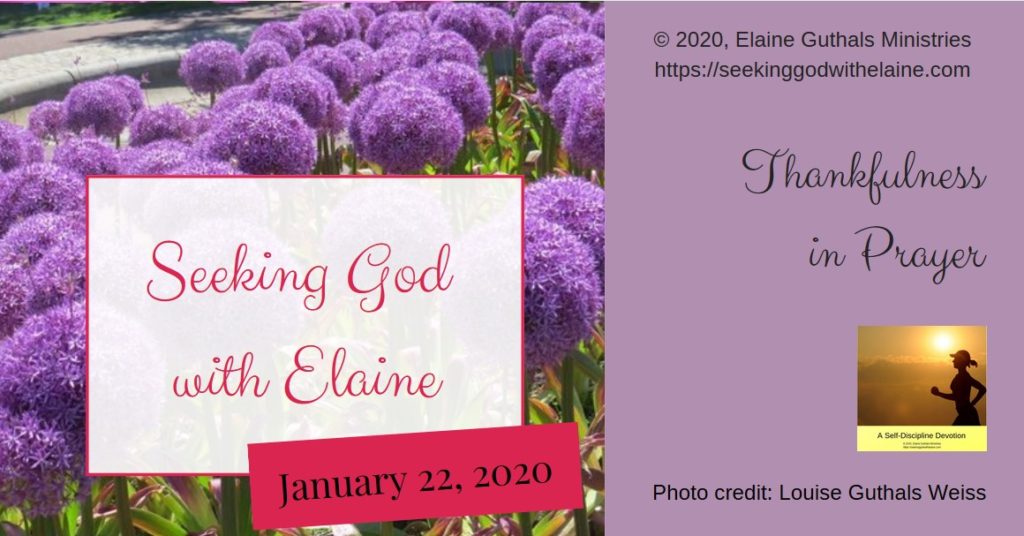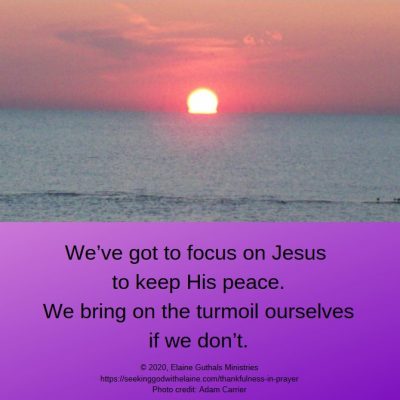Do we find it hard to pray when everything around us is in hurricane mode? How can we sustain our prayer lives when peace is gone? This devotion looks at the choices we should make.
Nuggets
- A thankful heart starts out with the peace of Christ.
- Our heart is the only thing that can steal our peace as it is our choice whether we are going to remain peaceful.
- Thankfulness is also a choice.
To read devotions in the What Is Prayer? series, click the appropriate button below.
Thankfulness in Prayer

Probably one of the hardest things to do is to pray when our worlds are in chaos. Still, we need to discipline ourselves to pray in all circumstances.
Let's Put It into Context
“Devote yourselves to prayer with an alert mind and a thankful heart” (Col. 4: 2 NLT)
We’ve talked about thankfulness before. The Holman Bible Dictionary defines thanksgiving as a response of gratitude to an act of God. It should be an integral part of our walk as a disciple.
How are we supposed to give thanks to God? “And give thanks for everything to God the Father in the name of our Lord Jesus Christ” (Eph. 5: 20 NLT). It should be through the name of Jesus.
We’ve also talked about the heart a couple of times. God’s peace, mercy and love is at our center. That is our foundation. We are to love God with all our heart, soul, strength, and mind.
So, how do we combine thankfulness and heart in our prayer life?
A Peace Issue
“And let the peace of Christ, to which you were also called in one body, rule your hearts. And be thankful” (Col. 3: 15 CSB)
A thankful heart starts out with the peace of Christ. But we don’t always feel the peace.
That may frustrate us sometimes. Don’t we God should take care of all the difficult stuff in our lives and leave us with smooth sailing?
I love what Maclaren pointed out. Plus, he used one of my favorite verses!
“Peace I leave with you. My peace I give to you. I do not give to you as the world gives. Don't let your heart be troubled or fearful” (Jn. 14: 27 CSB).
That is how I memorized the verse. Look at this translation.
“I am leaving you with a gift — peace of mind and heart. And the peace I give is a gift the world cannot give. So don’t be troubled or afraid” (Jn. 14: 27 NLT).
When God gave this verse to me, I was a teenager at church camp for the week. It was the second time I had been away from home without anyone from my immediate family. The only person I knew there was my cousin.
Right before God gave me this verse, He reminded me of an episode that I had in eighth grade. It was my second episode of this medial issue, so they sent me down to the Children’s Hospital to get it checked out.
They thought I had a blood clot. They thought I might die. No, it didn’t hit me in eighth grade.
It hit me at church camp. Alone with my cousin — and God.
Why did God bring up something two or three years later? I was already passed that scare. No, we didn’t find out it was migraines until probably five years after that.
God wanted to give me His peace. He wanted me to know that He was with me. God wanted me to know that He had plans for me.
I know. God created an upsetting situation to show me His peace. It may sound a little mixed up.
But it wasn’t. If He hadn’t, it wouldn’t have meant as much. I wouldn’t have remembered it these *cough* years later.
What Maclaren pointed out was, look at where Jesus was when He said this. Jesus and the disciples are at the Passover meal — His last Passover meal.
At the end of John 13, Jesus told Peter that he was going to deny Him (Jn. 13: 36-38). In John 14, He told them He is going away, but they couldn’t come right then (Jn. 14: 1-7). He promised to send the Holy Spirit (Jn. 14: 15-26).
Look where Jesus was going. He was going to Gethsemane (Jn.18: 1), where we all know He had a crisis moment. He was going to be arrested (Jn. 18: 2-12), tried, (Jn. 18: 13-40), and killed (Jn. 19: 6-42).
Jesus knew He was going to be facing all of this — and He was talking peace.
Well, Jesus knew peace wasn’t dependent on this world’s circumstances. He knew my peace wasn’t based on where I was. Peace was — and is — dependent on our knowing Him as our personal Savior.
A Heart Issue
“… rule your hearts …” (Col. 3: 15 CSB)
Why is this peace so important? “I find a law in my members that when I would do good evil is present with me. No power in heaven or earth will arrest that downward fall, unless it be laid upon the heart” (Arnot).
I read that to mean we must fight evil in our hearts. Therefore, our heart is what allows our peace to be stolen. If we aren’t alert, we let all these doubts and fears creep into our hearts and minds and steal our peace.
It is our choice whether we are going to remain peaceful. In order to keep that peace, we have to watch.
Remember what Swinnock said watchfulness is. It is “a diligent observation of ourselves in all things, and at all times, that we may please God always.
When we become believers, Jesus gives us His peace. But we focus on the world sometimes, so that steals our peace. “The hearts and lives of men are made troubled not by circumstances, but by themselves. Whoever can keep his own will in harmony with God’s enters into rest” (Maclaren).
Jesus’ peace has to rule our hearts. We’ve got to focus on Jesus to keep His peace. We bring on the turmoil ourselves if we don’t.

A Thankfulness Issue
“… And be thankful” (Col. 3: 15 CSB)
Okay. Back to prayer. Our heart is battling the evil, so that our peace is pretty nonexistent at the time.
We still have so much for which to be thankful. Wilson gives us a good list.
We are generally good at being thankful — until the peace is gone. We have to watch that we don’t loose the thankfulness because the sin of unthankfulness is “… ranked with the vilest sins” (Wilson).
Again, thankfulness is a choice. We have to chose to be thankful even when our peace is rocked.

Making the Connections
So, how does prayer fit into all of this? How can we be thankful when the peace is gone?
We have to keep gratitude as a priority. We have to be ready to be thankful in every circumstance.
We do that when God rules our hearts. When we give Him control of it lives, we know He is going to work things out (Rom. 8: 28) — even if it has to get bad for a while.
Only God can create this peace. And He gives it to us freely when we admit our sins, believe on Jesus as Redeemer, confess God as Sovereign Lord, and demonstrate that commitment by following our job description.
The ABCDs of Salvation
If you have not become a believer in Christ, please read through the
Plan of Salvation and prayerfully consider what God is asking you to do.A – admit our sins
B – believe His Son Jesus is our Redeemer
C – confess God as Sovereign Lord
If you have not become a believer in Christ, please read through the Plan of Salvation and prayerfully consider what God is asking you to do.
D – demonstrate that commitment by making any changes needed in our lives to
live the way in which God has called us
The Disciple’s Job Description
That means that we have to give up control of our lives. We have to submit.
How Do We Apply This?
- We choose to submit to God.
- We choose to focus on Him instead of circumstances.
- We accept peace is our duty as disciples (Robertson)
- We choose to be thankful — even in the bad times — because He will work things out for His good.
- We make thankfulness a habit.
- We really are content (Mt. 6: 25-26).
- Our actions show our thankfulness.
So, it is back to our attitude. We choose our attitude. We chose to have a thankful heart.
Gracious Heavenly Father. We’ve got it wrong. Our thankfulness is generally dependent on our circumstances. Rather, our thankfulness should be based on what You have done for us. You designed the plan of salvation so that we can be forgiven of our sins. Thankfully, You forgive us over and over when we ask. Show us our unconfessed sins so that we may ask Your forgiveness. Help us to turn away from them and turn to You. Amen.
What do you think?
Leave me a comment below (about this or anything else) or head over to my Facebook group for some interactive discussion.
If you don’t understand something and would like further clarification, please contact me.
If you have not signed up for the email daily or weekly providing the link to the devotions and the newsletter, do so below.
If God has used this devotion to speak with you, consider sharing it on social media.